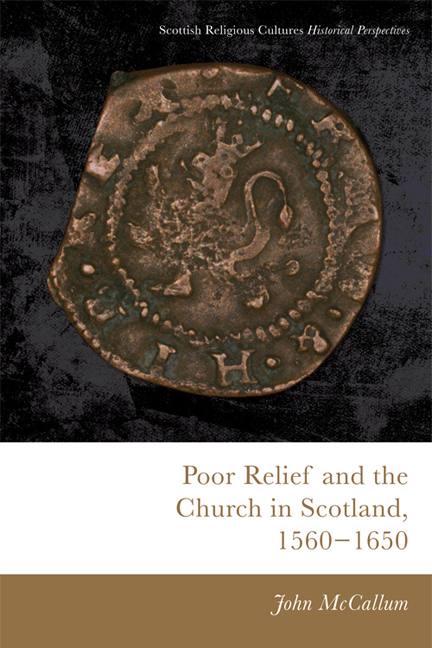Book contents
- Frontmatter
- Contents
- List of Tables
- Acknowledgements
- Conventions
- Abbreviations
- Map of Key Locations Mentioned
- Introduction
- 1 Ideas, Attitudes and Ambitions
- Part I The Development of Kirk Session Poor Relief
- 2 Urban Beginnings and Developments, c. 1560–c. 1610
- 3 Poor Relief Beyond the Main Burghs, c. 1590–c. 1650
- 4 Poor Relief Under Stress
- Part II The Nature of Kirk Session Poor Relief
- Conclusion
- Appendix Equivalent Values from Wages and Prices
- Bibliography
- Index
4 - Poor Relief Under Stress
from Part I - The Development of Kirk Session Poor Relief
Published online by Cambridge University Press: 14 September 2018
- Frontmatter
- Contents
- List of Tables
- Acknowledgements
- Conventions
- Abbreviations
- Map of Key Locations Mentioned
- Introduction
- 1 Ideas, Attitudes and Ambitions
- Part I The Development of Kirk Session Poor Relief
- 2 Urban Beginnings and Developments, c. 1560–c. 1610
- 3 Poor Relief Beyond the Main Burghs, c. 1590–c. 1650
- 4 Poor Relief Under Stress
- Part II The Nature of Kirk Session Poor Relief
- Conclusion
- Appendix Equivalent Values from Wages and Prices
- Bibliography
- Index
Summary
Introduction
The Reformed Kirk's poor relief system, like all other aspects of its parochial programme, unfolded gradually after 1560. Chapters 2 and 3 have stressed that it did not spring into place fully formed in all parishes. They also revealed that as kirk sessions developed relief was an integral element of their work and was very widespread by the start of the seventeenth century and often much earlier, especially in urban areas. Albeit at varying pace, it became the norm for lowland Scotland. However, having unpicked the expansion of the system, it is essential to consider how it managed during times of exceptional difficulty. How did kirk sessions cope when faced with major economic crisis, warfare and those recurring terrors facing all early modern societies, plague, fire and dearth? It would be misleading to assess relief systems primarily by their response to catastrophic circumstances, just as it would be wrong to discount such experiences as aberrations: they were facts of early modern life. But exploring their capabilities, responses and decisions at difficult times offers an opportunity to understand better the strengths and weaknesses of the system, as well as the assumptions and motivations which underpinned it.
This chapter assesses the ways in which ecclesiastical relief responded to and coped with crisis in three distinct contexts. The first is the famine which struck Scotland in the early 1620s, the second is the period of conflict including the wars of the three kingdoms in the 1640s (which included grain shortages and pestilence as well as the direct disruption of warfare), while the third section considers the system's responses to more localised emergencies and disasters. Much of the discussion is therefore focused on the seventeenth century half of the book's period. This is not to suggest that there were no such pressures in the sixteenth century, nor that there were no other significant problems between 1600 and 1650, but the early 1620s and 1640s were by far the most severe challenges to the relief system and they were also the most widespread and genuinely national periods of crisis.
- Type
- Chapter
- Information
- Poor Relief and the Church in Scotland, 1560–1650 , pp. 102 - 132Publisher: Edinburgh University PressPrint publication year: 2017



